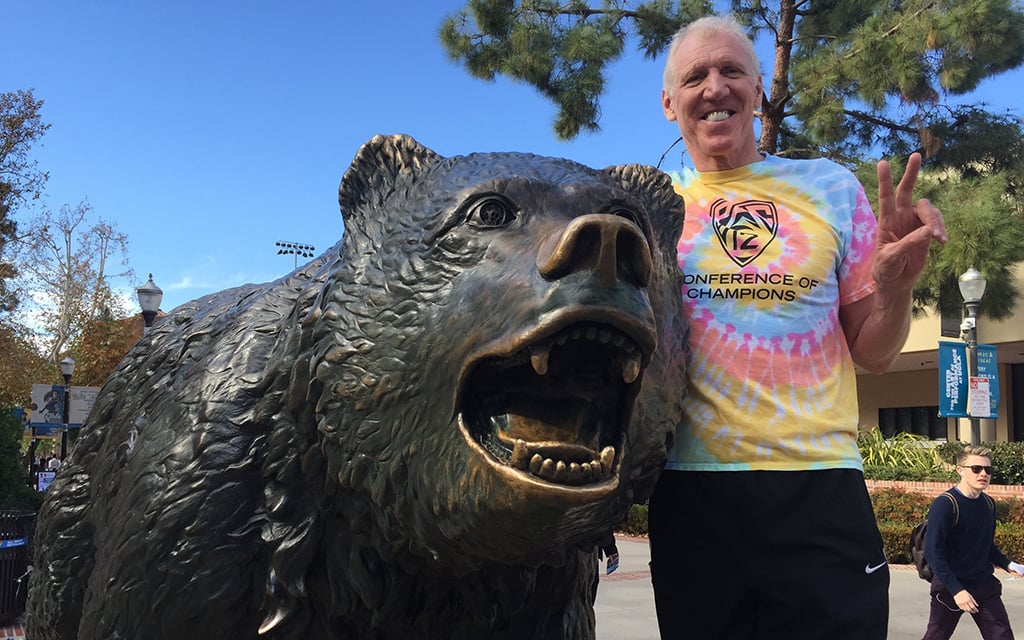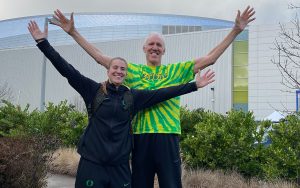
Bill Walton, a legendary figure in basketball and broadcasting, leaves an indelible mark on the sports world with his passing Monday. (Photo courtesy of Tim Sullivan)
PHOENIX – As the University of Arizona’s Pac-12 baseball title last Saturday night marked the final event in the conference’s current iteration, Monday’s passing of basketball legend Bill Walton signaled a true end of an era.
A passionate advocate for the “Conference of Champions,” Walton’s overwhelming joy and zest for life was reflected in his coverage of the Pac-12, the conference he won two NCAA championships representing at UCLA.
“(Bill) truly believed that the (Pac-12) conference was the best conference in the country,” said Tim Sullivan, a former ESPN live sports producer and close friend of Walton’s. “That was not only based in fact, number of national championships both team and individual that have been won by Pac-12 schools, but also in the classroom.”
Education played a large role in Walton’s life, stemming from his upbringing in a home not centered around sports. Neither of Walton’s parents were athletes – his mother, Gloria, a librarian and his father, Ted, a music teacher. Walton’s passion for knowledge never left and fed into his love for the Pac-12, just as much as the play on the court.
“He was so interested in the universities of the Pac-12 and how they were at the leading edge of so many incredible developments in our world,” Sullivan said. “The internet was developed in part at UCLA. The amazing things that Michael Crow is doing at ASU, and his theme of the New American University … Phil Knight and what he did with Nike at the University of Oregon. Stanford, arguably one of the greatest universities and learning centers in the world. The history of protest and amazing developments that have come out of the University of California.
“It just goes on and on, and he truly believed that there was no better place to go to school, there was no better place to live, than within the region of the Pac-12.”
After his time at UCLA, in which he was a three-time national player of the year, Walton was drafted No. 1 overall by the Trailblazers in the 1974 NBA draft. Although his career in the NBA was stricken by injuries, Walton was a two-time NBA champion, NBA Finals and league MVP, and was enshrined in the Basketball Hall of Fame in 1993.

Bill Walton’s passion for life and the Pac-12 Conference was unmatched throughout his signature basketball and broadcasting career. (Photo courtesy of Tim Sullivan)
While Walton’s basketball accolades speak for themselves, his post-playing career was just as memorable. After overcoming a life-long stuttering disorder in his late 20s, Walton served as a basketball commentator and analyst for over 20 years. Known for his unconventional broadcasting style and wild personality, Walton was unmistakable as soon as you turned on any game he was calling. Although Walton went on tangents unrelated to the play on the court from time to time, his wealth of knowledge about the game of basketball was always evident.
“He was the most prepared announcer I’ve ever dealt with, and he was also the kindest, nicest, I’ll say, person I’ve ever dealt with,” said Doug Tammaro, ASU’s senior associate athletic director of media relations. “He had no boundaries into letting people know who does a good job, and also was just so great to be around with regards to other people wanting to see him or meet him.
“He loved being Bill Walton.”
Away from the court, Walton was an advocate for social justice. As a student at UCLA, Walton was arrested for protesting the Vietnam War, and was never afraid to stand up for what he felt was right. Walton was also an enormous fan of the Grateful Dead, with the band dubbing him their biggest fan in the world.
Following Walton’s passing from a long battle with cancer, there was an outpouring of near-universal praise and memories of the man who was larger than life. Often proclaiming himself “the luckiest guy in the world,” the sports world came together to celebrate Walton.
“It’s just been so uplifting to see Bill’s legacy inspire others,” Tammaro said. “I’m truly convinced that there’s some people that are going to change the way they live because of the way Bill lived, and how they’re seeing it. I just really believe that he was that special.
“I think he’s one of these people that he made a huge impact on the earth while he was living, but I think the way he lived is going to impact people forever down the road even after he passed.”
Walton’s passion for life was evident in every second he lived. His one-of-a-kind personality packed into a 6-foot-11 frame will not soon be forgotten.
“He had this way of expressing himself, but also connecting with people in his life, in his orbit that made you feel better about yourself, and I never met anybody like Bill ever,” Sullivan said. “We’re so super fortunate to have known him, and I would say all of our lives are richer because we knew Bill.”
